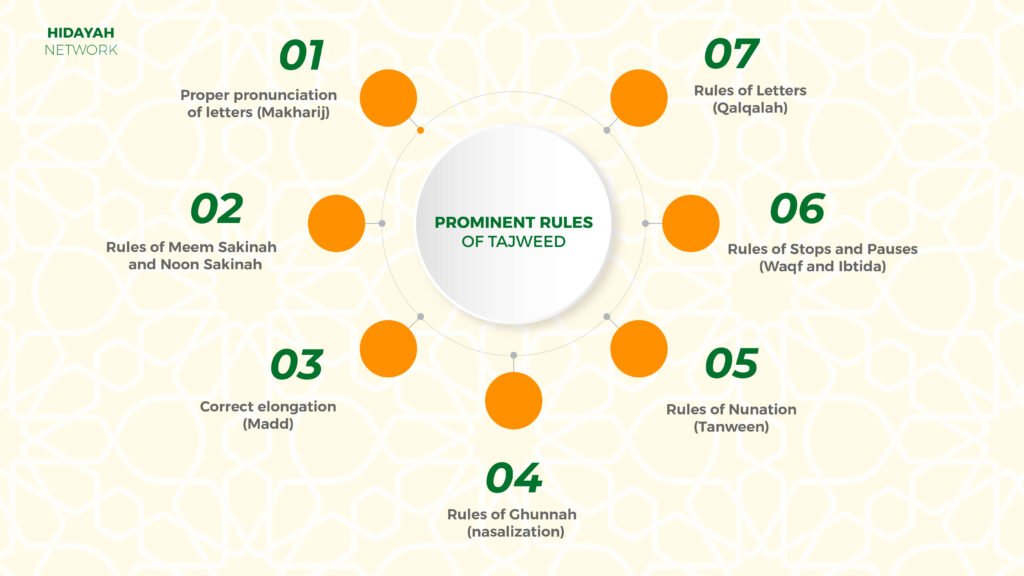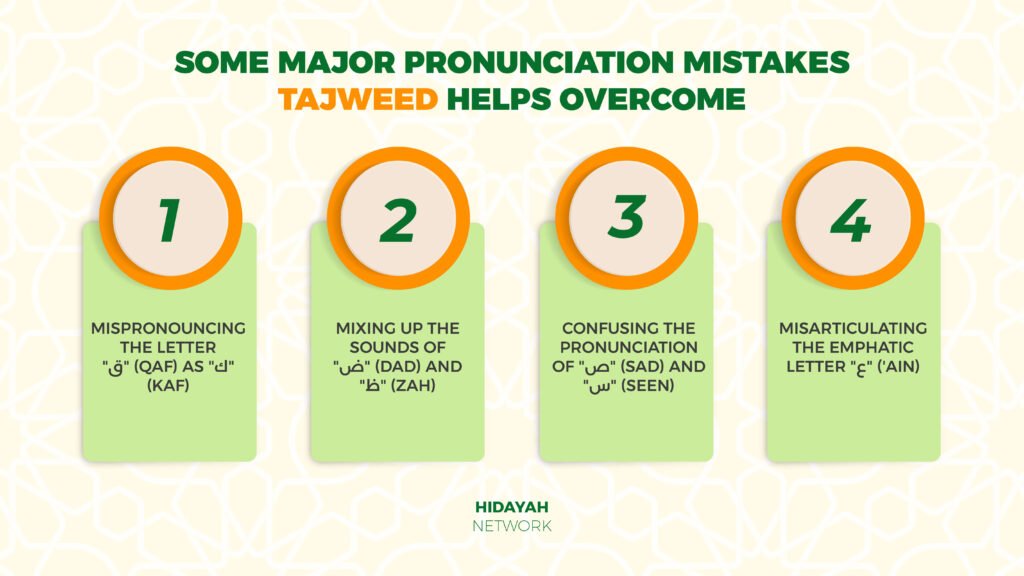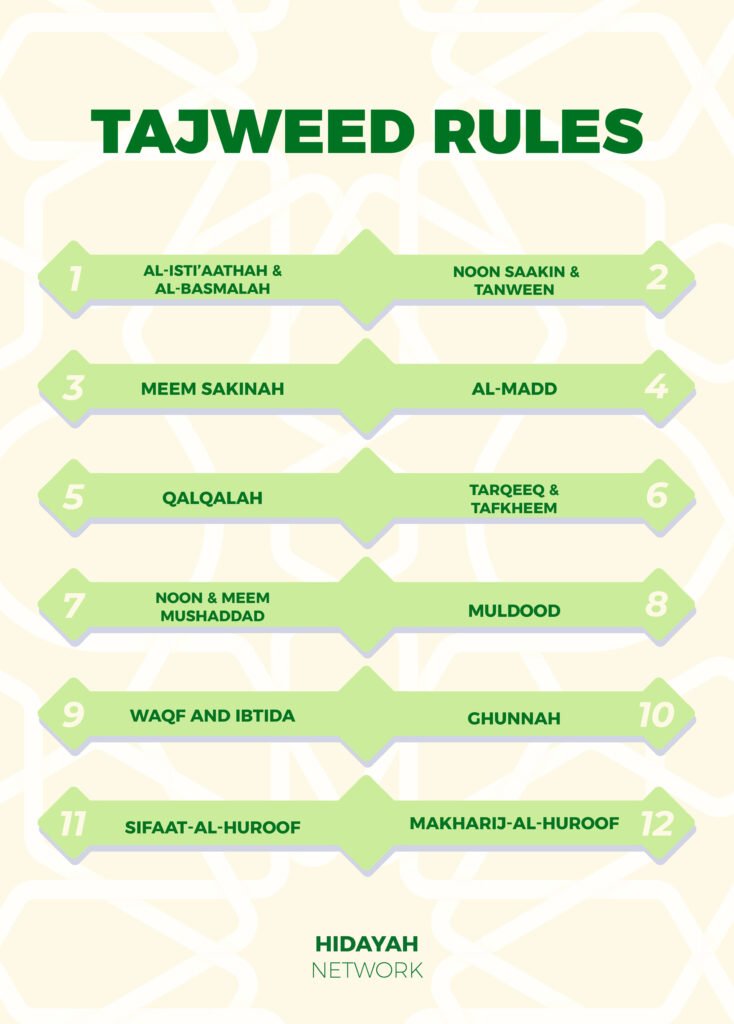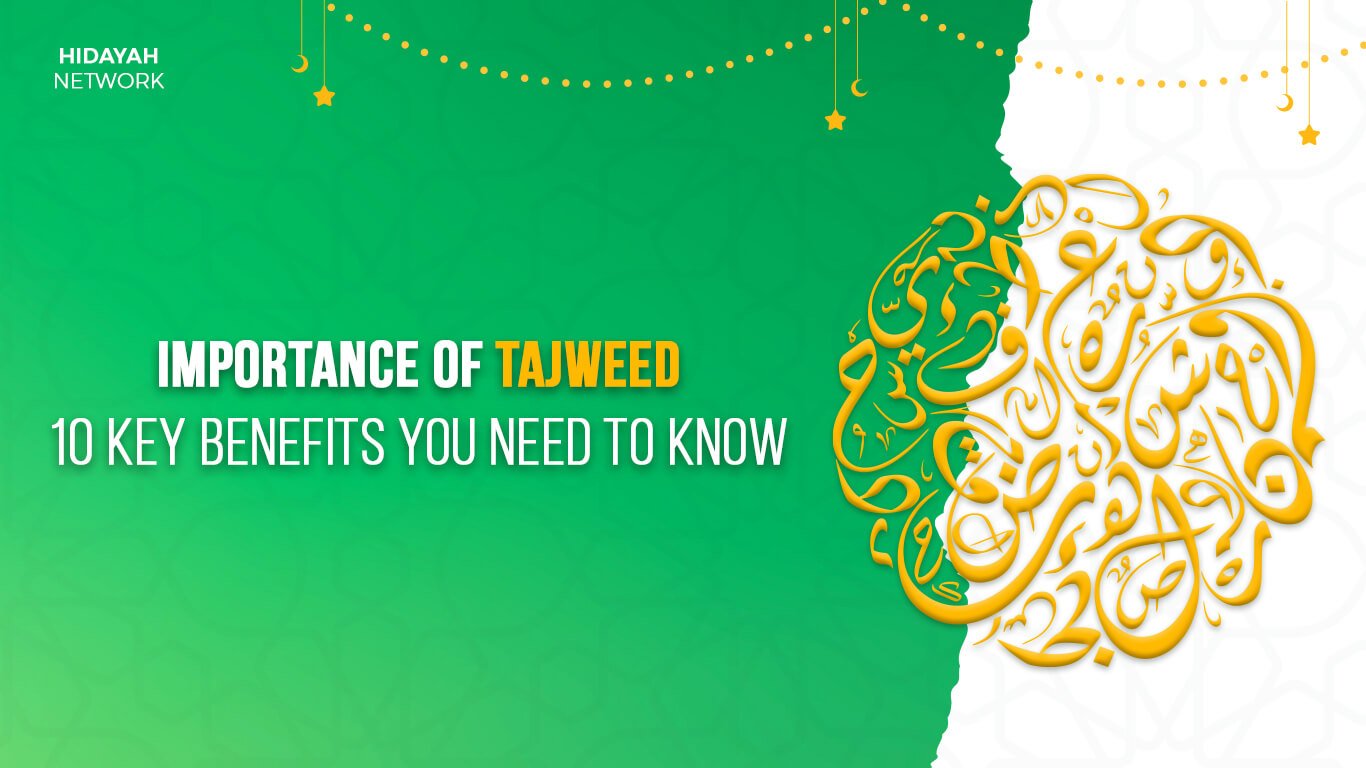Discovering why Tajweed is important helps us understand the Quran better. Tajweed isn’t just about saying words right; it’s about showing respect and devotion. Today, we’ll talk about how Tajweed can make us feel closer to the Quran.
Tajweed helps keep the Quran true to its original words and makes our recitation sound beautiful, just like how the Prophet Muhammad did it. Learning Tajweed ensures there are no pronunciation mistakes, and more.
Let’s explore why Tajweed matters and how it can make us feel more connected to our faith and each other.
Table of Contents
Toggle1. Helps us Follow the Rules of Quranic Recitation
Following the rules of Quranic recitation means reading the Quran in the way it was meant to be read. This includes things like pronouncing each letter correctly, knowing when to pause, and making the right sounds.
Following these rules helps us understand the Quran better and show respect for it. Tajweed makes sure we’re doing it right, so we don’t accidentally change the meaning of what’s being said. It also makes our recitation sound beautiful and makes it easier for others to listen to and understand
Prominent rules of Tajweed:
- Proper pronunciation of letters (Makharij).
- Correct elongation (Madd).
- Rules of Nunation (Tanween).
- Rules of Meem Sakinah and Noon Sakinah (Idgham, Iqlab, and Ikhfa).
- Rules of Ghunnah (nasalization).
- Rules of Stops and Pauses (Waqf and Ibtida).
- Rules of Letters (Qalqalah).

2. Learning Tajweed Helps Forming a Spiritual Connection with the Quran
Learning Tajweed helps us feel closer to the Quran spiritually. It means when we recite the Quran, we connect deeply with its message and with Allah. Following Tajweed rules helps us recite with reverence and sincerity, making our hearts more receptive to the Quran’s guidance.
When we form this spiritual connection, it brings us peace, comfort, and strengthens our faith.
An ayah that emphasizes the beauty of Quranic recitation is from Surah Al-Muzzammil, Ayah 4: “And recite the Qur’an distinctly with measured recitation.”
3. Helps to Read the Quran the Way it Should Be Read
Learning Tajweed helps us read the Quran exactly how it should be read. This means understanding the right sounds, pauses, and emphasis in each verse. When we read the Quran correctly, we honor its divine message and show respect to Allah.
Tajweed ensures that we don’t accidentally change the meaning of what’s written. It helps us grasp the true essence of the Quranic verses and follow the teachings accurately.

4. Ensures There’s No Misinterpretation of the Quranic Words
Tajweed ensures that we don’t misunderstand the words of the Quran. This means reading each word correctly so we don’t get the wrong idea. When we recite the Quran with Tajweed, we avoid misinterpreting its message and teachings.
For example, if we don’t pronounce a letter correctly, it might change the meaning of the word. Likewise, if we don’t pause at the right places, we might misunderstand the context.
Tajweed helps us avoid such misinterpretations by teaching us the correct way to recite the Quran, ensuring that we understand and follow its guidance accurately.
Note: Lack of pause leading to misunderstanding commands, such as “Do not” instead of “Do” in a sentence. Thus, joining learning the Quran Tajweed online is the best place to begin.
5. Join the Esteemed Company of Noble Angels
Learning Tajweed allows us to recite the Quran beautifully, akin to how the noble angels do in heaven. This means our recitation reaches a level of excellence that is pleasing to Allah, just like the angels’ recitation.
When we recite the Quran with Tajweed, we emulate the angels’ reverence for Allah’s words and join their esteemed company. This benefits us by drawing us closer to Allah and earning His favor. By reciting the Quran with Tajweed, we aspire to attain a status similar to that of the noble angels, enhancing our spiritual journey and connection with Allah. As the Quran says, “And they are in the presence of Your Lord, exalting Him.” (Quran 7:206)
Get 40% OFF Now!
6. Ensures No Pronunciation Mistakes While Reading
Ensuring no pronunciation mistakes while reading means saying each word correctly when reciting the Quran. It’s like making sure we don’t mix up the sounds of letters. Tajweed helps us avoid mistakes so we can recite accurately and understand the Quran better.
When we recite with correct pronunciation, we honor the sacredness of Allah’s words. Tajweed benefits us by preventing misunderstandings and preserving the integrity of the Quranic text. Here’s how to pronounce Arabic letter with Tajweed to begin your journey.
Some major pronunciation mistakes Tajweed helps overcome are:
- Mispronouncing the letter “ق” (qaf) as “ك” (kaf).
- Mixing up the sounds of “ض” (dad) and “ظ” (zah).
- Confusing the pronunciation of “ص” (sad) and “س” (seen).
- Misarticulating the emphatic letter “ع” (‘ain).

7. Knowing the Right Time for Waqf and Ibtida
Knowing the right time for Waqf (stopping) and Ibtida (starting) is crucial in Quranic recitation. Waqf occurs at the end of verses, where one stops to take a breath or reflect.
For example, in Surah Al-Fatihah, one pauses at the end of each verse, like after “Alhamdulillahi Rabbil ‘aalameen” (Praise be to Allah, the Lord of all worlds). Ibtida signifies the beginning of a new verse, where recitation resumes.
In Surah Al-Ikhlas, after completing “Qul Huwa Allahu Ahad” (Say, “He is Allah, [who is] One”), one proceeds to “Allahu As-Samad” (Allah, the Eternal Refuge). Correctly observing Waqf and Ibtida maintains the flow of recitation and ensures proper understanding.
It also reflects the reverence and respect owed to the Quran. Mastering these timings enhances the beauty and authenticity of Quranic recitation.
8. Harmonious Recitation in Prayer
Harmonious recitation in prayer involves reading the Quran with beauty and correctness. Tajweed ensures our prayers sound pleasing to Allah and are done properly. Prophet Muhammad emphasized the importance of Tajweed in a hadith where he said, “He who does not recite the Quran in a pleasant tone is not of us.”
This hadith highlights that beautiful recitation is integral to being a true follower of Islam. By mastering Tajweed, we not only fulfill our duty in prayer but also connect with Allah in a profound and melodious manner, enhancing the spiritual experience of worship.
9. Enhanced Understanding of the Quranic Text
Enhanced understanding of the Quranic text through Tajweed involves grasping the deeper meanings and messages conveyed in each verse.
- Tajweed ensures accurate pronunciation and proper application of rules, which aids in comprehending the linguistic intricacies of the Quran.
- By adhering to Tajweed, readers can decipher the intended emphasis, pauses, and nuances within the text, leading to a more profound understanding of its themes and teachings.
- Correct recitation also facilitates memorization, allowing individuals to internalize and reflect upon the Quranic verses more effectively.
- Tajweed fosters a sense of reverence and respect towards the sacred scripture, fostering a deeper connection with its divine wisdom.
10. Improved Pronunciation and Articulation
Improved pronunciation and articulation through Tajweed involve mastering the correct sounds and characteristics of Arabic letters. It focuses on precise pronunciation, distinguishing between similar-sounding letters, such as “ض” (dad) and “ظ” (zah).
Tajweed also emphasizes the proper articulation of elongated vowels and consonants, enhancing clarity and coherence in recitation. Through practice and guidance, learners develop the ability to produce sounds from the correct points of articulation in the mouth or throat.
This meticulous attention to detail not only refines pronunciation but also elevates the overall quality of recitation, making it more pleasing to listen to and conducive to understanding the Quranic text.
How Many Tajweed Rules are There?
There are 12 fundamental Tajweed types, each crucial for accurate Quranic recitation. These rules encompass various aspects, including pronunciation, elongation, and articulation.
Some rules, like Noon Saakin and Tanween, Meem Sakinah, and Al-Madd, address specific letter attributes and their pronunciation. Others, such as Qalqalah and Ghunnah, focus on sound characteristics and nasalization. Additionally, rules like Waqf and Ibtida dictate proper pauses and beginnings in recitation, ensuring coherence and understanding.
Understanding nuances like Tarqeeq & Tafkheem (lightening and heavy pronunciation) and Sifaat-al-Huroof (qualities of letters) further refines recitation. Mastery of Makharij-al-Huroof (pronunciation points) ensures accurate articulation. Learning all rules, including their sub-types, is vital to ensure precise and beautiful Quranic recitation.
Here’s a list of all the Tajweed types:
- Al-Isti’aathah & Al-Basmalah.
- Noon Saakin and Tanween.
- Meem Sakinah.
- Al-Madd.
- Qalqalah.
- Tarqeeq & Tafkheem.
- Noon and Meem Mushaddad.
- Muldood.
- Waqf and Ibtida.
- Ghunnah.
- Sifaat-al-Huroof.
- Makharij-al-Huroof.

Is It Necessary to Read the Quran with Tajweed?
While reading the Quran with Tajweed is not obligatory, it is highly recommended and beneficial. Tajweed enhances the beauty and correctness of recitation, elevating one’s spiritual connection with the Quran.
Learning Tajweed reduces the likelihood of mistakes in pronunciation and articulation, ensuring that the Quran’s message is conveyed accurately. It also demonstrates respect for the sacredness of the Quran and the importance of preserving its integrity.
Moreover, mastering Tajweed allows individuals to engage more deeply with the Quranic text, understanding its nuances and linguistic intricacies. Overall, learning Tajweed is essential for anyone seeking to recite the Quran with precision, reverence, and excellence.
Why is Tajweed Important to Muslims?
Tajweed holds immense importance for Muslims as it ensures the accurate and beautiful pronunciation of the Quranic verses. By adhering to Tajweed rules, reciters can effectively convey the profound meanings of the Quran to listeners, touching their hearts and souls.
It emphasizes the necessity of reading with care, enabling individuals to deeply absorb the message of the verses and comprehend how to apply the teachings and guidance in their daily lives.
Through Tajweed, Muslims uphold the sanctity of the Quran, honor its divine message, and strive to attain a deeper spiritual connection with Allah and His word.
How to Learn Tajweed?
Here are best tips to learn Tajweed:
- Start by mastering the Arabic alphabet and understanding the basic pronunciation of each letter.
- Study Tajweed rules systematically, focusing on one rule at a time to ensure thorough understanding.
- Practice regularly with a qualified teacher or reputable online resources to receive feedback and guidance.
- Listen attentively to proficient reciters to develop a good ear for correct pronunciation and melodious recitation.
- Utilize Tajweed books and materials with clear explanations and examples to reinforce learning.
- Record yourself reciting and compare it to professional recitations to identify areas for improvement.
What is the Reward of Tajweed?
Meticulous and precise recitation of the Quran promises the honor of joining Allah’s angels. This reward extends beyond the temporal realm, emphasizing its eternal significance.
Muslims are urged to interpret this guidance both literally and metaphorically, understanding that the benefits of Tajweed transcend immediate gains, impacting their spiritual journey for eternity.
Final Words
Tajweed is not just about correct pronunciation; it’s a pathway to deepening our connection with the Quran. From enhancing spiritual understanding to preserving the authenticity of the Quranic text, Tajweed plays a pivotal role in the lives of believers.
It is through Tajweed that Muslims can aspire to join the esteemed company of Allah’s angels, receiving eternal rewards for their dedication and commitment to reciting the Quran with excellence.
Most important FAQs
How to improve Tajweed?
To improve Tajweed, you can start by seeking guidance from a qualified Quranic teacher or tutor who specializes in Tajweed. Regular practice is crucial, as it helps reinforce proper pronunciation, intonation, and articulation. You can also use online resources and mobile apps specifically designed to assist in Tajweed learning.
How to learn Quran with Tajweed at home?
Learning the Quran with Tajweed at home is entirely possible. You can enroll in online Quranic courses or find reputable Tajweed instructional videos. Many websites and apps offer interactive lessons, allowing you to practice Tajweed from the comfort of your home.
Is it mandatory to learn Tajweed?
While it’s not obligatory in the same way as the fundamental acts of worship (e.g., prayer, fasting), Tajweed is highly recommended and regarded as an important aspect of Quranic recitation. Learning Tajweed helps ensure that the Quran is recited accurately and with proper reverence, which is a sign of respect for Allah’s (SWT) words.
What does the Quran say about Tajweed?
The Quran itself does not explicitly mention Tajweed as we understand it today, but it does emphasize the importance of reciting the Quran with “Tarteel” recitation.
What is the importance of Tajweed in Arabic?
Tajweed is significant in Arabic because it governs the correct pronunciation and articulation of Arabic letters and sounds. It ensures that each letter is pronounced from its specific point of articulation and with the appropriate attributes.

About Author

